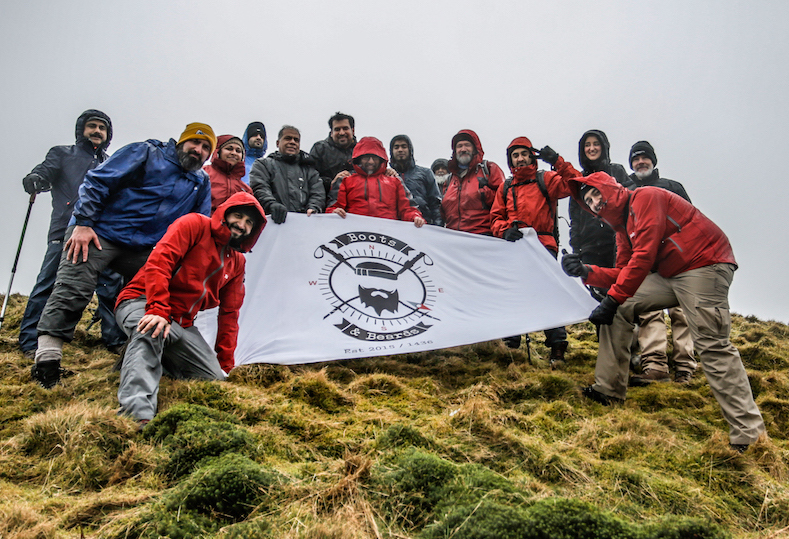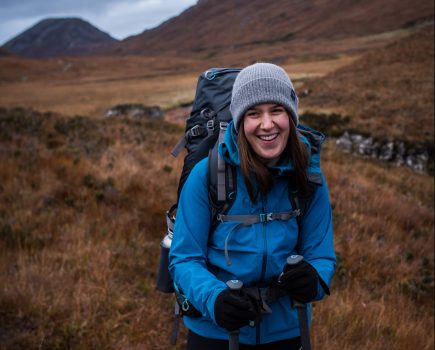Walking groups today are more diverse and inclusive than ever. We ask members from four very different clubs to share their experiences.
Walking groups can offer life-changing opportunities to boost your skills and fitness levels, explore new places and make likeminded friends. We asked members from a diverse range of groups to share their experiences.
Boots & Beards
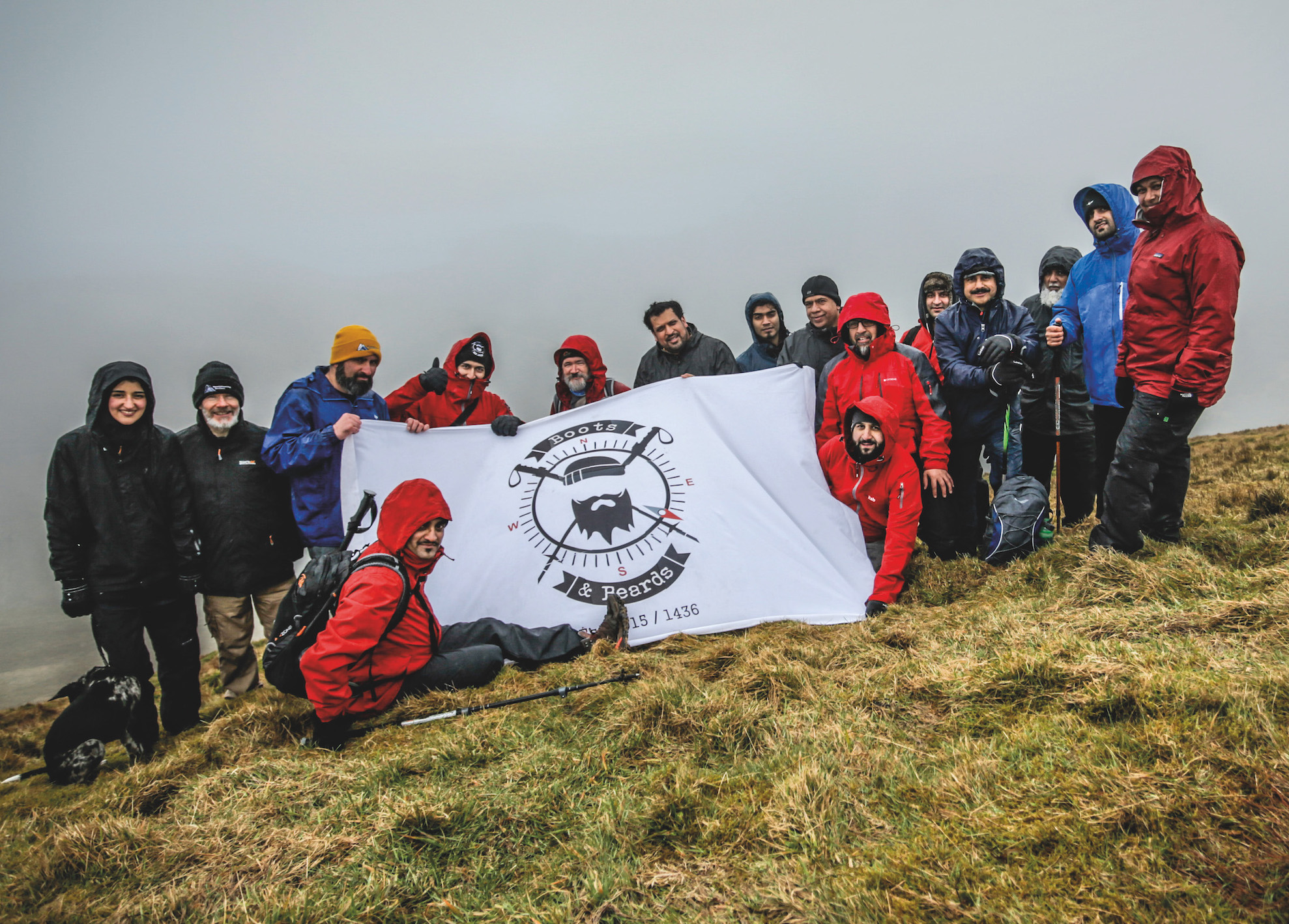
Boots and Beards aims to make lives better through hillwalking. Photo: Finalcrux Films
Zain Sehgal is one of the founding members of Boots & Beards, a Glasgow-based Asian hillwalking club.
“Boots & Beards started off as a family-orientated project. The idea was to get the younger generation (our own kids!) to move away from technology and explore what we used to explore back in the days. As a family unit, we decided that the parents would take the kids every second week and we would make an effort to get out and enjoy what we have on our own doorstep with our kids. When we were out at these beautiful locations we would take pictures and videos, and when we got back we would post these on social media. Then our friends started to get in touch and ask why we never informed them of the walk and whether they could join future walks.
“This is the point at which the organisation got set up professionally. Although we started off with hillwalking, our participants have taken a lead role in other activities they were keen on and have led those activities successfully. Bonnie Boots was launched later, as some women within our community wanted to be part of programmes that were not only led by women but where the environment was female-orientated as well.
“I have seen the difference that people have made to themselves – in terms of fitness, but also the knock-on effects on lifestyle and eating habits within their own families. This is what excites me, and each new activity we do is all about bettering the lives of people within our own community.
“When our forefathers came to this country, they came with one mission – to earn money and to send that back to their families. In doing so, they did not have a chance to explore Scotland or the surroundings. Our generation thankfully has this chance as our families are settled here.”
Highland Hillwalking Club
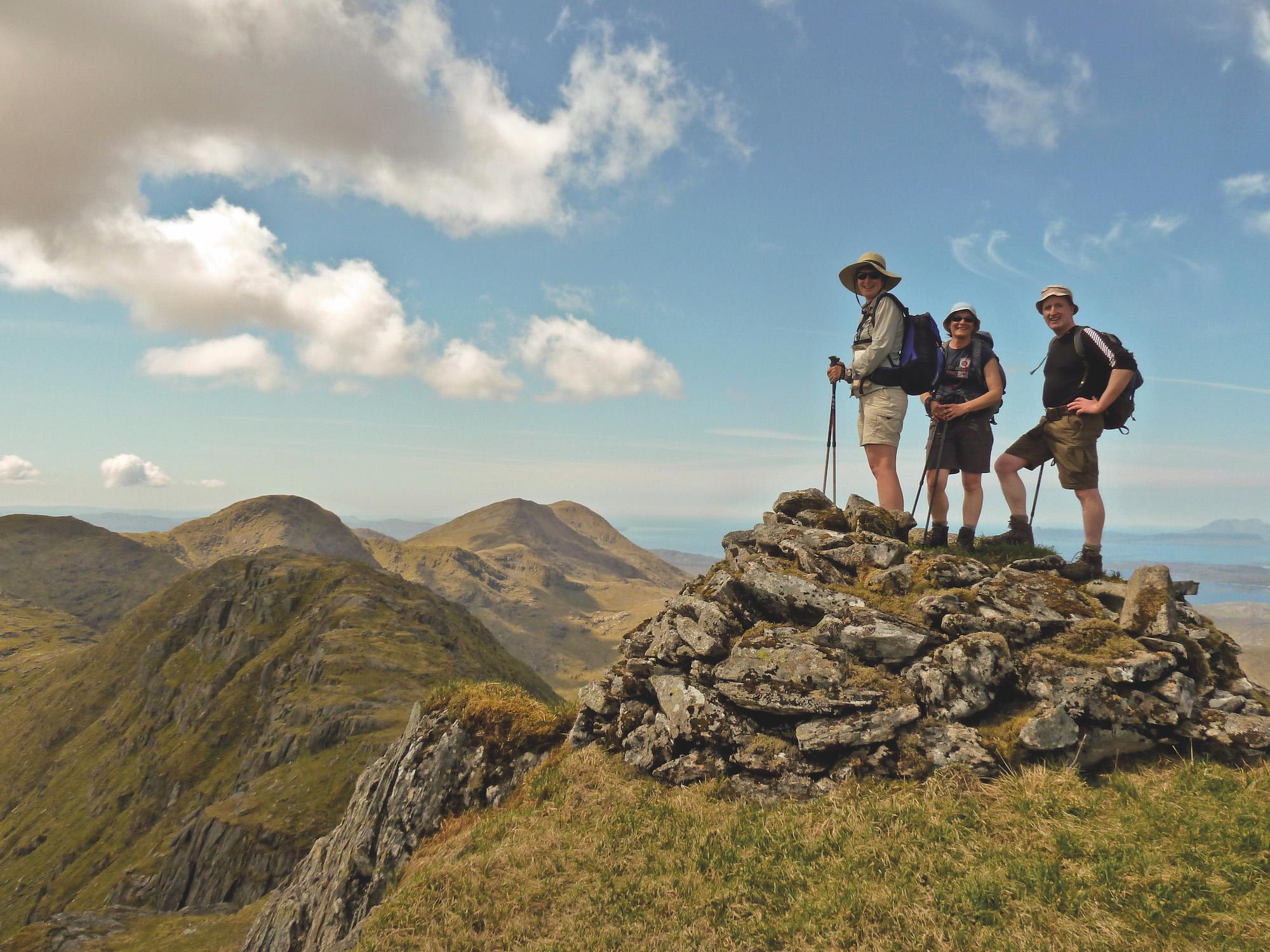
Highland Hillwalking Club has a packed schedule of meets across the year. Photo: Highland Hillwalking Club
Alex Joss is a founding member of the Highland Hillwalking Club, a long-established group for hillwalking enthusiasts based in the Scottish Highlands.
We formed the club way back in 1978. Before that, two groups of us used to go out walking regularly and, at the time, the only club in the area was Inverness Mountaineering Club. There was a feeling that they were more interested in rock climbing, so some of us felt that it was time an official hillwalking club was set up in the area.
“We’ve always worked on the basis that there’s a programme for the whole years and generally the club goes out once per fortnight. It’s not a club that takes people on led expeditions. The club programme informs everybody of each venue, where and when to meet, and the range of hills it’s possible to walk up. Sometimes everybody will go on the same walk, but other times we’ll divide into three or four groups doing different things.
“What’s good about it is that the meets are pre-planned and you know about them for a year in advance, so you always have that group of people to go out with. That’s particularly useful in the winter – I’m quite happy to walk on my own in the summer, but I’m warier of doing that in the wintertime. A lot of people share transport, too, so it has plenty of advantages. Inverness has a lot of people who come from somewhere else to work here and they’re looking for some way of going out. And gradually you make a lot of friends.”
OutdoorLads
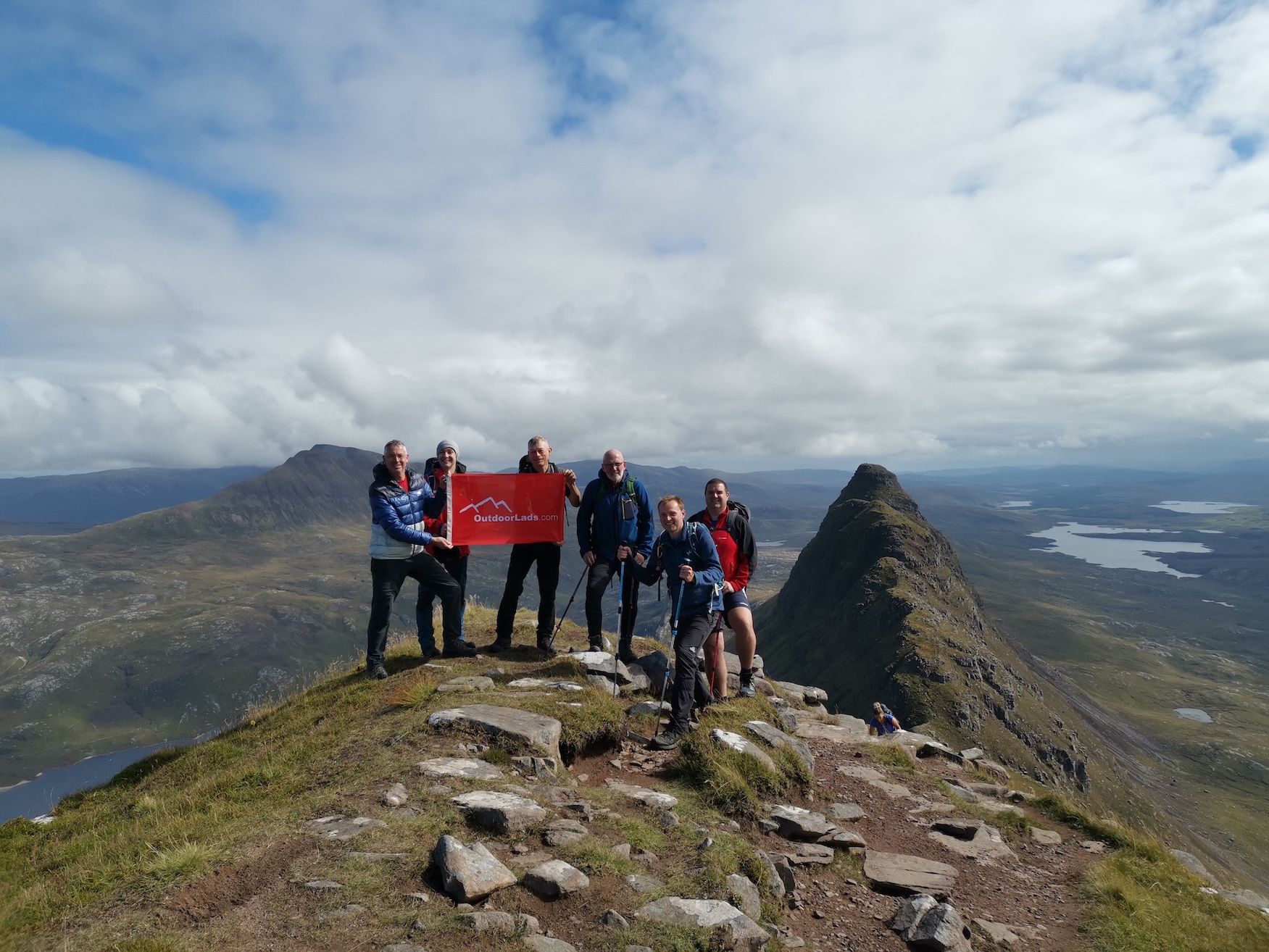
Celebrating on the summit of Suilven, Assynt. Photo: Outdoor Lads
Liam Russell is the programme manager at OutdoorLads, a UK-wide walking group on a mission to get more gay, bi and trans men into the outdoors.
“The group started in the Manchester area during 2006, when some gay guys got together on Meetup, agreed they were fed up of the Manchester scene being the only option for meeting with like-minded people, and decided to go on a camping trip. Around 20 guys got together and went camping at Great Langdale. It was a big success – so they formed OutdoorLads, which was registered as a charity in 2008.
“The original premise was that there wasn’t a walking group specifically for gay, bi and trans men, so we moved in and filled that gap. Now we have around 2,000 paid-up members and another 7,000 pay-as-you-go members. In a normal year, we run well over 1,000 events across the country. Those include day walking, climbing, cycling, camping weekends, hostel weekends and our ‘BIG weekends’, where 500 of our members get together to camp and do all sorts of outdoor events.
“We’re a national group and anyone is welcome to join one of our events. We always say that it doesn’t matter if the only thing you’ve ever climbed is the stairs – we have something suitable for you. We do big, difficult mountain walks and wild camping, but at the other end of the scale we also do leisure walks of 3-4 miles on made-up paths. One thing that’s great about OutdoorLads is that it encourages people to push themselves – it’s common for someone to start off with easy walks, get to meet people, and then a few months later they’re walking in the mountains.
“Members get to explore further afield, expand their social circle and make friends around the country. As a result, we also have about 17 different marriages in the group! That’s not the point of OutdoorLads – but it’s a nice bi-product.”
Disabled Ramblers
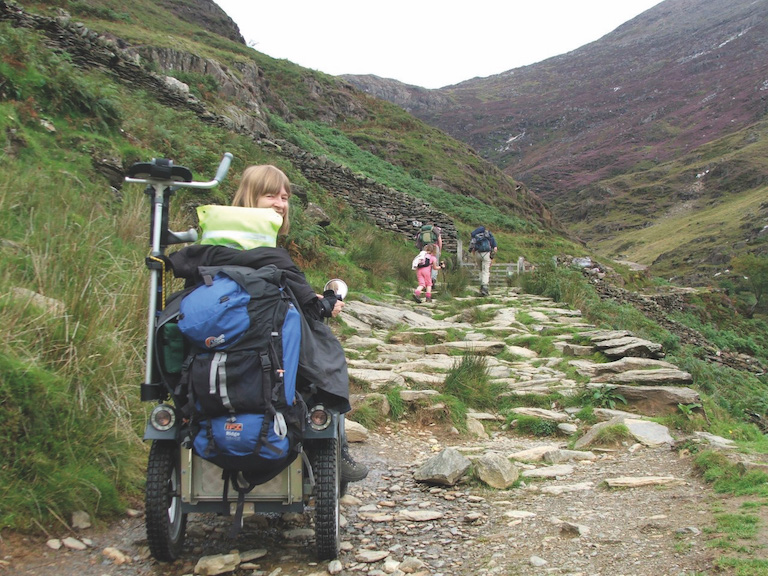
Members of the Disabled Ramblers club have climbed mountains like Pen y Fan and Drum. Photo: Disabled Ramblers
Paula Brunt is secretary and rambles organiser at Disabled Ramblers.
“When we started out in the 1990s, we were the Disabled Drivers Club. One of the founding members was Dr Mike Bruton, an engineer working for British Airways – he got some of his apprentices to make what they called a ‘rickshaw’ for him, which he took along the Ridgeway. They then went along the Thames Path Walkway with a specially-made ramp for getting over all the stiles and fences.
“We can’t really do that sort of thing anymore because everything has to be risk-assessed, but we still have a lot of fun! Normally we start in April and end in October, and each month we have a week of rambles in different parts of the country. On our national rambles we have a mobile support unit which carries our four loan scooters and doubles up as a disabled toilet. We go all over the place – Scotland, Snowdonia, Cornwall, the Chilterns… The only real barriers are gates and stiles, although mud and very steep inclines will slow us down. Our chairman has led a group up Drum and I’ve been up Pen y Fan – not via the easy route!”
“It completely transformed my life when I discovered Disabled Ramblers and I see that happening to other people all the time. There was a chap on our last ramble who had been stuck at home for six years. The whole day he just had this huge grin on his face. It is rewarding because you meet so many different people and also you don’t have to go roaming around the countryside on a mobility scooter worrying about what to do if anything happens – if you break down or get a puncture then there’s always somebody there to help.”

